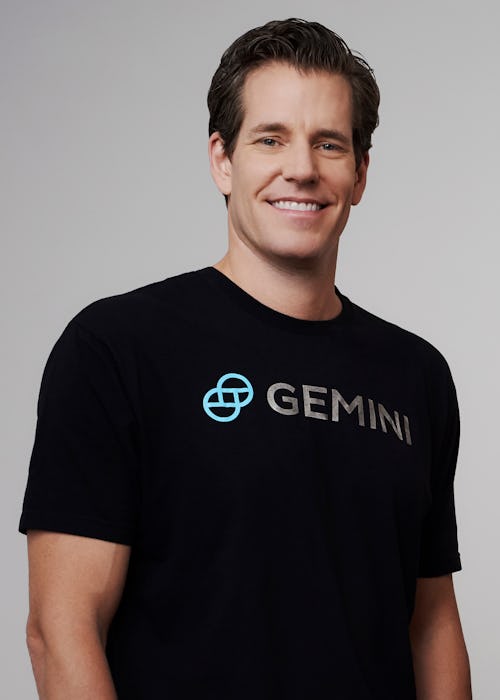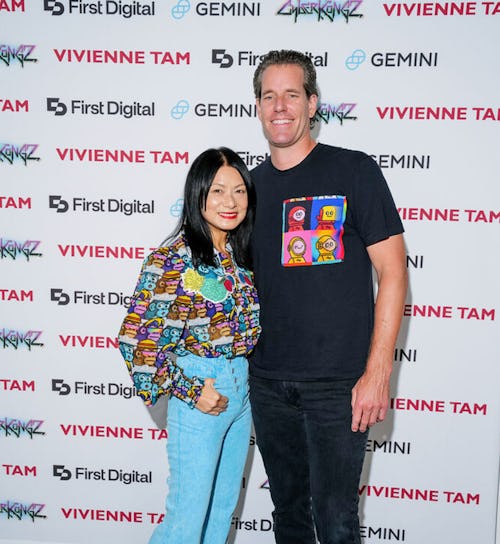
At yesterday’s Vivienne Tam New York Fashion Week show, her first in-person show since 2019, the designer showed off a collection full of flowing hems and patchwork knits — and blue chip NFT avatars.
Characters from the Bored Ape Yacht Club, CryptoPunks, CyberKongz, and Awkward Astronauts appeared sewn, printed, and even embroidered on apparel and accessories. “I wanted the creators of these NFTs, and even those unfamiliar with NFTs, to be excited and to think, ‘Wow, they’re alive!’” Tam said in a press release. Her show, according to its notes, was meant to “rewire the current fashion landscape.”



As models walked down the runway at Spring Studios, a range of pixels danced on a screen in the background. The imagery came courtesy of Scapes, a blockchain platform featuring 10,000 digital landscapes. Apes grinned on blazers; CryptoPunks dangled on earrings. Awkward Astronauts appeared on rainbow-colored dresses and tees, including the one worn by attendee Cameron Winklevoss.
Winklevoss, 41, partnered with Tam to bring the 2023 spring collection to life. Where the designer lacked metaverse expertise, he picked up: Winklevoss and his twin brother, Tyler, founded cryptocurrency exchange platform Gemini in 2014 with plans to build a decentralized metaverse. Gemini’s current offerings include Awkward Astronauts NFTs.
Input caught up with Cameron Winklevoss before the show to discuss how the fashion partnership came about, what his vision for the metaverse is, and how Mars Junction — the rock band he performs in with Tyler — plays into all this.

How did this project with Vivienne Tam come about?
Vivian made a dress with Awkward Astronauts, which is the NFT community that started on Nifty Gateway, which is Gemini’s NFT platform. And I think Tam knew a couple of people on our team. They had collaborated before, and she was excited about doing a crypto-inspired collection of dresses. We wanted to get crypto in front of different audiences.
What inspired you to enter the fashion world?
I think it’s important to get crypto around more people. It’s very much a global movement, so we have to get in front of as many people as possible. We’re going to onboard the next billion people into [the metaverse]. And NFTs are a fun, creative, accessible way for people to experience crypto and the future.

How would you describe the metaverse in broader terms for people who aren’t really in that realm?
The best way to think of [the metaverse] is if Web2 added a dimension with social. Web1 was very one-dimensional, more like sharing written information or like a postcard. Web2 added social elements and different connections. Web3 is much more immersive — I’m sure you’ve seen videos of people wearing Oculus Rifts, or you’ve seen the movie Ready Player One.
I hope it’s decentralized in the future and that users control their data and all their information. In Web2, we really handed that over to companies to hold, mine, and monetize for their gain or benefit.
What are your thoughts on [onetime nemesis] Mark Zuckerberg and Meta’s version of the metaverse?
I think the metaverse that we’re trying to help enable and build is the decentralized one. That’s the one we’re focused on. There will be centralized ones, and people may choose to interact with one over the other, or a combination [of the two], but we’re really focused on that decentralized future.
Recently we’ve been seeing a lot of NFTs infiltrating spaces that aren't necessarily within the metaverse. Are you working on any other projects expanding their influence?
Gemini is powering Starbucks Odyssey, a Web3 loyalty program. I think we’ll launch later this fall. We don’t really know where it’s going to go and some of it won’t work, but some of it might.

Gemini laid off about 10 percent of its employees in June, citing “turbulent market conditions.” Do you think NFTs and crypto are faltering?
Well, there’s definitely been a downturn in markets in general, crypto included, but we’re still building for the future. I think NFTs are here to stay. We’re in the winter, but it is a season, and seasons change. We’ve been through winters many times before. We’re not strangers to the downturn. And so we’re just continuing to build.
On a different note, has being in your band Mars Junction informed any of your NFT or crypto decisions, or is it a separate venture?
We actually gave free NFT art to people who attended one of our shows, and it was kind of an experiment of proof of attendance. I suspect there will be a lot more of those projects and experiments coming in the future. I think even like a fashion show, instead of having a ticket stub, you could get an NFT that commemorates [the experience] and have art from it or something super-unique. That experience is also digital and could create a community.
But no NFT-related music for now.
I think there’s a lot of directions that can go in. We don’t know exactly where, but with Mars Junction, we’ve been experimenting. We’re probably going to write music in the next couple of months, and maybe if we drop it, we’ll drop it through NFTs. We’re still figuring it out.







